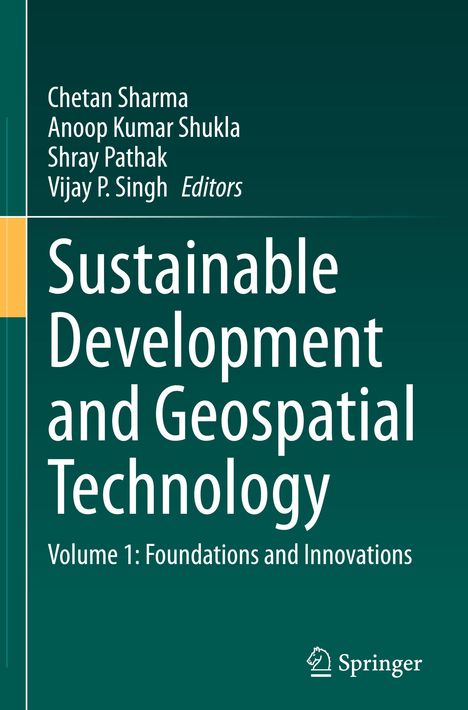Sustainable Development and Geospatial Technology, Gebunden
Sustainable Development and Geospatial Technology
- Volume 1: Foundations and Innovations
(soweit verfügbar beim Lieferanten)
- Herausgeber:
- Chetan Sharma, Vijay P. Singh, Shray Pathak, Anoop Kumar Shukla
- Verlag:
- Springer Nature Switzerland, 09/2024
- Einband:
- Gebunden, HC runder Rücken kaschiert
- Sprache:
- Englisch
- ISBN-13:
- 9783031656828
- Artikelnummer:
- 11974387
- Umfang:
- 304 Seiten
- Nummer der Auflage:
- 2024
- Ausgabe:
- 2024
- Gewicht:
- 678 g
- Maße:
- 241 x 160 mm
- Stärke:
- 21 mm
- Erscheinungstermin:
- 21.9.2024
- Hinweis
-
Achtung: Artikel ist nicht in deutscher Sprache!
Weitere Ausgaben von Sustainable Development and Geospatial Technology |
Preis |
|---|---|
| Buch, Gebunden, HC runder Rücken kaschiert, Englisch | EUR 219,03* |
Klappentext
This two-volume set showcases the various ways in which geospatial technology can be used to achieve sustainable development goals across different sectors such as urban planning, natural resource management, agriculture, disaster management, and energy management. The books provide insights into the potential of geospatial technology in promoting sustainable development practices and addressing challenges related to climate change, environmental degradation, and socio-economic development. Both volumes together are a comprehensive guide that showcases the potential of geospatial technology in promoting sustainable development practices across different sectors, and will serve as an essential resource for professionals, policymakers, researchers, and students interested in sustainable development and geospatial technology.
Volume 1 introduces the intertwined realms of sustainable development and geospatial technology. It navigates readers through the fundamental principles of sustainable development, exploring its goals and the pivotal role geospatial technology plays in its realization. Beginning with an overview of these critical concepts, it subsequently dives into the core foundations of geospatial technology, covering Geographic Information Systems (GIS), remote sensing, spatial data analysis, and data visualization. The volume also encompasses the practical aspects of sustainable urban planning, natural resource management, and transportation planning using GIS, underpinning the relevance of geospatial technology in addressing contemporary global challenges.
Biografie (Chetan Sharma)
CHETAN SHARMA is Director of R&D at Luminant Worldwide, a leading Internet professional services firm. In this role, he provides vision and strategic direction, directs R&D efforts, and focuses on exploring and evangelizing emerging technologies. He is frequently invited to speak at industry conferences worldwide and is often quoted in media publications. He is also the author of Wireless Internet Enterprise Applications (Wiley) and he holds patents in wireless communications.
